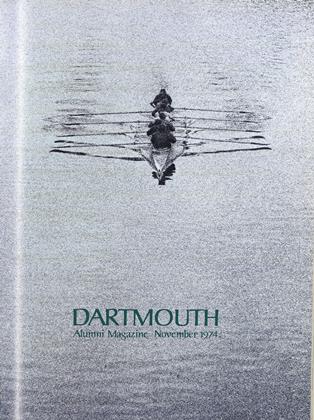GERTRUDE STEIN had not seen a football game since 1902, but in late October 1935 she came to the Yale Bowl with her constant companion, Alice B. Toklas, and watched Dartmouth. battle Yale. Here is how it happened.
After graduation from Dartmouth in 1924, I went to work at Harcourt, Brace and Company and by 1935 had become editor of the textbook department. My wife, Helen Grace Carlisle, a writer with six novels published in the late twenties and the thir-ties and I had just moved from New York City into Connecticut. Grace and I bought a house in West Norwalk from Anne Nichols, the author of Broadway's long-running farce, Abie'sIrish Rose, and we began to mingle in the social and literary life of Fairfield County. There was an enclave at Riverside, where Alfred and Ellen Harcourt, Donald Brace (co-founder with Alfred of Harcourt Brace), and Gus Gehrs (sales manager of the trade department) had built houses. But we consciously avoided Riverside, preferring not to have a 24-hour dose of office people.
Alfred Harcourt, a formidable man in his late forties, sat at the top. Each day at the office he'd make rounds, exercising his seigneurial privilege of slapping the rounded bottoms of favorite and unwary secretaries. He would come and sit at your desk and say, "What's the scandal?" and you had the feeling that you could tell him anything. He would not only listen with real interest but come back with keen, helpful comments. His little dark moustache bristled, and behind the big glasses lay a pair of large and strikingly beautiful blue eyes, always lit bright with dynamism.
Once established in Connecticut, we soon developed what became a small tradition: The Harcourts and the Reids would always go to the Dartmouth-Yale game together. In 1935 I had ordered the customary four tickets, when AH came into my office and said, "Look, Gertrude Stein and Alice B. Toklas are coming out to Riverside for the weekend. So I guess we'd better call off the trip to the Yale game." However, I had a better idea and suggested that we get two more tickets and take the ladies from France to the game.
In 1935 Gertrude Stein was at the peak, or more accurately, on the high plateau of her long career. She had shortly before seen her opera, Four Saints in Three Acts, staged in New York and she had written The Autobiography of Alice B. Toklas. A strange thing, writing her companion's autobiography? Not for Gertrude Stein! She wrote it "as simply as Defoe did the autobiography of Robinson Crusoe." One of the titles she considered was Wives ofGeniuses I Have Sat With.
The two ladies from Paris were delighted, as it turned out, to swell our football party to six. Grace and I drove to Riverside and left our Buick in the Harcourt driveway and we all climbed into the ample Harcourt Cadillac. We had the traditional picnic lunch on the grass of the parking lot at the Yale Bowl - with whiskey in moderation. Our guests were rather stubby women, with short hair, and they did most of the talking (Gertrude 75 per cent and Alice 25 per cent). Once seated in the Bowl, Miss Stein was fascinated by the huddles of the two teams. She said, "Here's a typically American thing. The huddle is like the old Indian war dance: they get around in a circle and then dash off." During the time between the halves, one of my drunken Dartmouth friends came up and offered Gertrude a drink from his flask, which she turned down in a friendly way. She was a perfectly delightful woman. It was a good, close game, but I don't remember whether or not Dartmouth won.
Gertrude Stein (left) and Alice B. Toklas arrive in America.
After retiring from Harcourt Brace, James Reid wrote his ownliterary autobiography, An Adventure in Textbooks. While hewatched Gertrude Stein watch the 1935 game, Dartmouth brokethe "Yale Jinx," 14-6.
 View Full Issue
View Full Issue
More From This Issue
-
 Feature
FeatureDartmouth De Gustibus: Food for Thought
November 1974 By MICHAEL STUART -
 Feature
FeatureThe Great Rip-off
November 1974 By V.F.Z. -
 Feature
FeatureYou Can Go Home Again
November 1974 By DICK REDINGTON '64 -
 Feature
Feature"ring O bells!"
November 1974 By ELIZABETH F. MOORE -
 Article
ArticleBig Green Teams
November 1974 By JACK DtGANGE -
 Article
ArticleFurther Mention
November 1974 By J.H.









